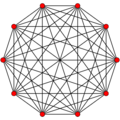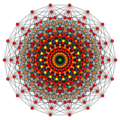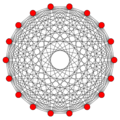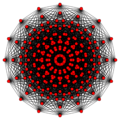Nine-dimensional space
In mathematics, a sequence of n real numbers can be understood as a point in n-dimensional space. When n = 9, the set of all such locations is called 9-dimensional space. Often such spaces are studied as vector spaces, without any notion of distance. Nine-dimensional Euclidean space is nine-dimensional space equipped with a Euclidean metric, which is defined by the dot product.
More generally, the term may refer to a nine-dimensional vector space over any field, such as a nine-dimensional complex vector space, which has 18 real dimensions. It may also refer to a nine-dimensional manifold such as a 9-sphere, or any of a variety of other geometric constructions.
Geometry
9-polytope
A polytope in nine dimensions is called a 9-polytope. The most studied are the regular polytopes, of which there are only three in nine dimensions: the 9-simplex, 9-cube, and 9-orthoplex. A broader family are the uniform 9-polytopes, constructed from fundamental symmetry domains of reflection, each domain defined by a Coxeter group. Each uniform polytope is defined by a ringed Coxeter-Dynkin diagram. The 9-demicube is a unique polytope from the D9 family.
| A9 | B9 | D9 | |||||||||
|---|---|---|---|---|---|---|---|---|---|---|---|
 9-simplex |
 9-cube |
 9-orthoplex |
 9-demicube | ||||||||
References
- H. S. M. Coxeter:
- H. S. M. Coxeter, Regular Polytopes, 3rd Edition, Dover New York, 1973
- Kaleidoscopes: Selected Writings of H. S. M. Coxeter, edited by F. Arthur Sherk, Peter McMullen, Anthony C. Thompson, Asia Ivic Weiss, Wiley-Interscience Publication, 1995, ISBN:978-0-471-01003-6 Wiley::Kaleidoscopes: Selected Writings of H.S.M. Coxeter
- (Paper 22) H. S. M. Coxeter, Regular and Semi Regular Polytopes I, [Math. Zeit. 46 (1940) 380–407, MR 2,10]
- (Paper 23) H. S. M. Coxeter, Regular and Semi-Regular Polytopes II, [Math. Zeit. 188 (1985) 559–591]
- (Paper 24) H. S. M. Coxeter, Regular and Semi-Regular Polytopes III, [Math. Zeit. 200 (1988) 3–45]
- Table of the Highest Kissing Numbers Presently Known maintained by Gabriele Nebe and Neil Sloane (lower bounds)
- . (Review).

